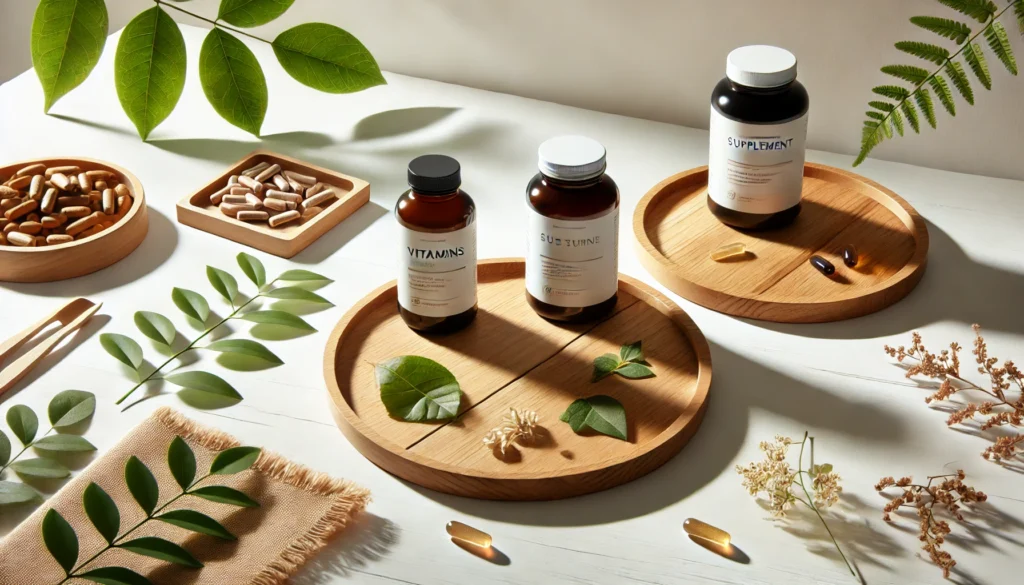Why Brand Reputation Matters in the Supplement Industry
In an era where wellness is becoming more personalized, the importance of selecting reputable vitamin brands has never been more crucial. With a surge in public interest in nutritional supplementation, a wide array of companies have entered the marketplace—but not all are created equal. Reputable vitamin brands offer more than just clever marketing; they deliver consistency, transparency, and scientifically backed formulations. Consumers seeking long-term health outcomes need assurance that what they’re taking is safe, effective, and true to its label claims. This makes brand integrity a non-negotiable component in evaluating vitamin products.
You may also like: The Best Herbal Supplements and Natural Pills for Focus, Energy, and Everyday Wellness

What Defines Trustworthy Vitamin Brands?
Trustworthy vitamin brands distinguish themselves through quality control, third-party testing, and ethical manufacturing practices. One of the key differentiators is compliance with current Good Manufacturing Practices (cGMPs), which ensures that products are produced in a clean, controlled, and regulated environment. Additionally, these brands often submit their products to independent third-party labs that test for purity, potency, and contaminants. Labels on such products will often display seals from NSF International, USP, or ConsumerLab, all of which signify adherence to high standards. Transparency is also a hallmark; trustworthy brands provide detailed sourcing information and disclose their ingredient lists without proprietary blends that obscure the actual dosages.

The Risk of Choosing Non-Reputable Vitamin Brands
Failing to identify reputable vitamin brands can expose consumers to significant risks. Poorly manufactured supplements may contain fillers, heavy metals, or ingredients in quantities that do not match the label. Some even include banned substances or prescription drug analogs without disclosure. This is not merely a quality issue—it’s a public health concern. For those with allergies, chronic conditions, or taking other medications, undisclosed ingredients can have dangerous interactions. Trustworthy vitamin brands mitigate these risks through meticulous testing, transparent practices, and professional accountability.

Key Certifications to Look For When Evaluating Brands
To ensure you’re purchasing from reputable vitamin brands, look for third-party certifications that validate quality and safety. The USP Verified Mark indicates the product contains the ingredients listed in the declared potency and amounts and that it does not contain harmful levels of contaminants. NSF Certified for Sport is another valuable certification for athletes seeking assurance that their supplements are free of banned substances. Trustworthy vitamin brands will also be open about their manufacturing facilities and whether they meet FDA inspection standards. In addition to these logos, well-designed and informative websites with downloadable Certificates of Analysis (COAs) add to a brand’s credibility.
Red Flags: What to Avoid When Shopping for Supplements
While searching for supplements that align with natural wellness, it’s just as important to know what to avoid. Steer clear of products with exaggerated claims like “cures all ailments” or “instant results.” Reputable vitamin brands rely on evidence-backed language, often citing clinical studies. Another red flag is a lack of customer service contact or transparency in product sourcing. Brands that hide behind proprietary blends or fail to provide dosage specifics may be skirting regulations or trying to obscure ineffective formulations. Trustworthy vitamin brands welcome scrutiny because they have nothing to hide.
Trust Built on Transparency and Science
What sets trustworthy vitamin brands apart is their unwavering commitment to science and transparency. They fund or participate in clinical studies, often publish the results, and engage with healthcare professionals to ensure ethical formulation. These brands also educate consumers through clear labeling and accessible ingredient glossaries. Reputable vitamin brands make it easy for users to understand what they’re taking and why it matters, which not only builds trust but fosters long-term customer relationships.
How to Research and Compare Reputable Vitamin Brands
Doing your homework is key to identifying reputable vitamin brands. Begin with the brand’s website—does it provide lab testing results, manufacturing standards, and a quality guarantee? Look for reviews not just from general consumers, but also from registered dietitians, physicians, or pharmacists. Independent consumer review platforms and watchdog groups like Labdoor can offer impartial evaluations. Trustworthy vitamin brands are also often recommended in professional healthcare circles and may be available in integrative clinics, not just big-box retailers.
Frequently Asked Questions (FAQ) on Trustworthy and Reputable Vitamin Brands
How can I tell if a vitamin brand is trustworthy?
To determine if a vitamin brand is trustworthy, look for third-party certifications such as NSF, USP, or GMP. These seals indicate that the product meets rigorous standards for purity and potency. Trustworthy vitamin brands also provide transparent labeling, clear sourcing information, and publish Certificates of Analysis for their supplements. Customer reviews from verified purchasers can offer additional insight into the brand’s reliability. Many reputable vitamin brands also invest in clinical research to support their formulations, which is a major sign of scientific integrity.
Are expensive vitamins always from reputable vitamin brands?
Price alone isn’t a reliable indicator of quality. While some reputable vitamin brands do charge more due to premium ingredients or testing protocols, high cost doesn’t automatically equal effectiveness. Trustworthy vitamin brands prioritize efficacy and bioavailability, but they also balance that with ethical pricing. Conversely, some overpriced products rely heavily on marketing with little clinical backing. It’s better to assess the company’s manufacturing standards, third-party testing, and ingredient transparency rather than the price tag alone.
What are the red flags to watch for when evaluating a supplement company?
If a supplement company lacks third-party testing, that’s your first warning sign. Additionally, vague health claims without scientific evidence can be misleading. Trustworthy vitamin brands avoid terms like “miracle cure” and instead focus on evidence-backed benefits. Reputable vitamin brands will also clearly list their ingredients and avoid proprietary blends that mask exact dosages. Be cautious if the company avoids questions about sourcing or doesn’t offer customer support to back their products.
Why is third-party testing important when choosing reputable vitamin brands?
Third-party testing adds a layer of accountability that in-house testing cannot offer. Trustworthy vitamin brands use independent labs to verify that their products contain what they claim, without harmful contaminants like heavy metals or pesticides. This is especially critical for products like fish oil, protein powders, and herbal blends, which can vary widely in purity. Reputable vitamin brands also tend to publish these results or make them available upon request. This transparency builds consumer trust and separates high-quality brands from generic or questionable ones.
Do trustworthy vitamin brands usually work with healthcare professionals?
Yes, many trustworthy vitamin brands actively consult with dietitians, physicians, and naturopathic doctors during the product formulation process. Reputable vitamin brands are often the preferred choice among integrative practitioners because their formulas are backed by science and tested for quality. Some brands even offer practitioner-only lines with specialized formulations for targeted health needs. Brands that invest in ongoing education for both providers and consumers further demonstrate their commitment to wellness. Look for partnerships with medical advisory boards as a sign of professional credibility.
Can I find trustworthy vitamin brands in big-box stores or only in health shops?
While independent health stores often specialize in reputable vitamin brands, some big-box stores have improved their offerings in recent years. However, it’s essential to do your own research, as mass retailers may stock lower-tier options alongside high-quality ones. Trustworthy vitamin brands will remain consistent in quality regardless of where they’re sold. Checking the brand’s website for their retailer list can help confirm if the store is an authorized distributor. When in doubt, contact the brand directly to verify product authenticity.
Are newer companies less likely to be reputable vitamin brands?
Not necessarily. While longevity can indicate reliability, many emerging trustworthy vitamin brands are founded by healthcare professionals or scientists passionate about innovation. These brands often bring fresh formulations and sustainable practices to the table. The key is to assess transparency, testing protocols, and ingredient sourcing. Reputable vitamin brands—regardless of their age—are clear about their values and quality standards. Independent certifications and a clean digital footprint can also support a new brand’s trustworthiness.
How do online reviews influence the perception of reputable vitamin brands?
Online reviews can provide useful insights but should be evaluated critically. Trustworthy vitamin brands typically have consistent reviews across multiple platforms, not just their own website. Look for reviews that detail specific results and customer service experiences. Be cautious of generic or overly enthusiastic reviews that may be incentivized or fake. When combined with verifiable lab testing and transparent labeling, authentic user feedback can reinforce the reputation of reputable vitamin brands.
What should I expect from customer service when dealing with trustworthy vitamin brands?
Exceptional customer support is a hallmark of trustworthy vitamin brands. Expect responsive communication, flexible return policies, and product guarantees that reflect the brand’s confidence. Reputable vitamin brands also provide access to health professionals or trained product specialists who can answer detailed questions. A company that stands behind its products without hiding behind complicated refund procedures tends to earn long-term consumer loyalty. Transparency in sourcing, allergen disclosure, and shipping practices are also key indicators of solid customer care.
Can reputable vitamin brands help address specific health issues?
Yes, many reputable vitamin brands offer targeted formulations to support conditions such as digestive health, cognitive function, hormonal balance, and immune resilience. Trustworthy vitamin brands often base their formulations on clinical studies and adjust dosages to reflect therapeutic needs. For example, they may offer vitamin D in its bioavailable D3 form or magnesium in glycinate form to support absorption. These specialized offerings distinguish high-quality brands from generic multivitamin producers. Always consult a healthcare provider when using supplements to address medical concerns, but reputable vitamin brands can certainly play a supportive role in holistic care.
Final Thoughts on Choosing the Right Brand for Natural Wellness
In the evolving landscape of holistic health, choosing reputable vitamin brands is an essential investment in your long-term well-being. These trustworthy vitamin brands do more than meet regulatory standards—they exceed them. By embracing transparency, third-party testing, and scientific validation, they make it easier for consumers to achieve their health goals with confidence. Navigating the supplement aisle doesn’t have to be daunting when you know what markers of quality to seek. The more educated you are, the more empowered your decisions will be.
clean label supplements, pharmaceutical grade vitamins, third-party tested supplements, certified organic supplements, non-GMO vitamin options, evidence-based nutrition, dietary supplement safety, holistic health practices, verified nutritional brands, sustainable vitamin sourcing, FDA compliant supplements, professional grade nutraceuticals, science-backed vitamins, allergen-free supplements, supplement ingredient transparency, supplement quality assurance, vitamin manufacturing standards, supplement testing certifications, consumer trusted vitamins, practitioner recommended brands
Further Reading:
10 Tips for Choosing High-Quality Dietary Supplements.
How to Choose High Quality Vitamins and Supplements
The information contained in this article is provided for general informational purposes only and is not intended to serve as medical, legal, or professional advice. While NewsHealthWatch strives to present accurate, up-to-date, and reliable content, no warranty or guarantee, expressed or implied, is made regarding the completeness, accuracy, or adequacy of the information provided. Readers are strongly advised to seek the guidance of a qualified healthcare provider or other relevant professionals before acting on any information contained in this article. NewsHealthWatch, its authors, editors, and contributors expressly disclaim any liability for any damages, losses, or consequences arising directly or indirectly from the use, interpretation, or reliance on any information presented herein. The views and opinions expressed in this article are those of the author(s) and do not necessarily reflect the official policies or positions of NewsHealthWatch.

